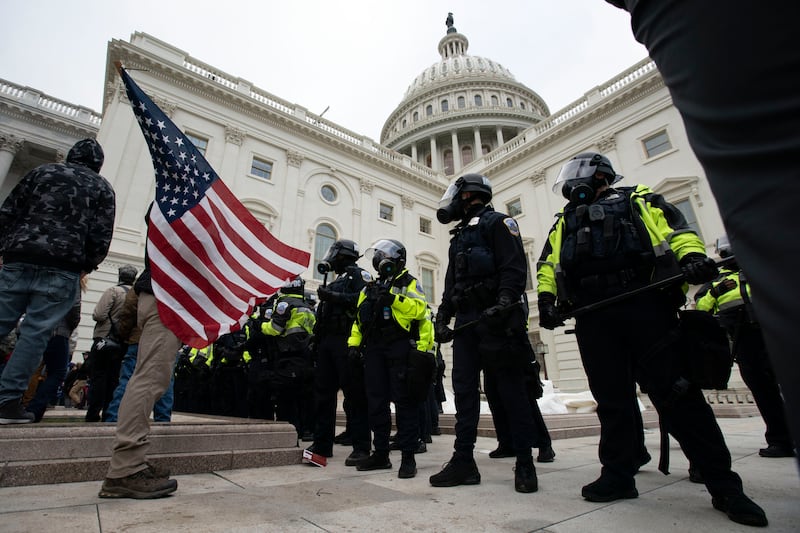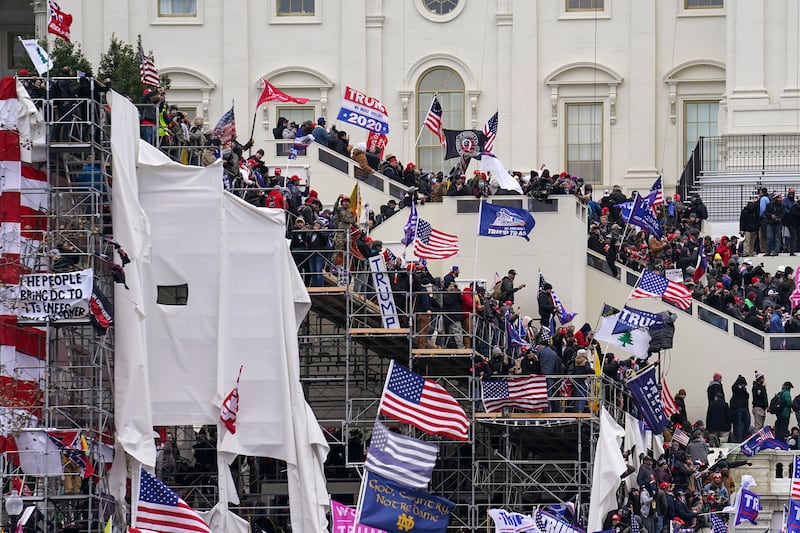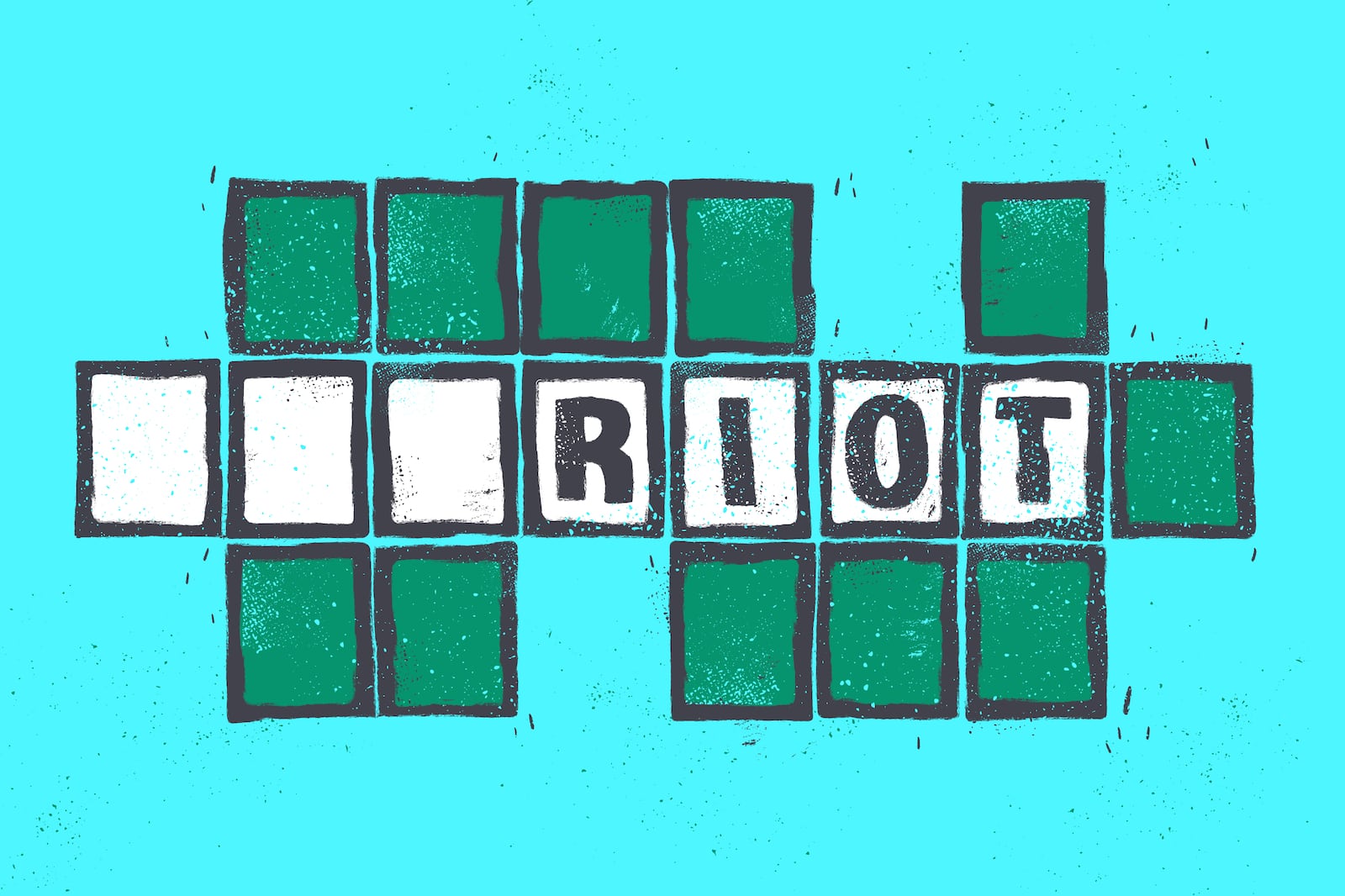In the aftermath of the deadly Capitol riot, much remains uncertain about its origins and intent, but one thing is clear: There were a whole lot of “patriots” involved.
“Hold the line, patriots,” the man who wore a horned hat, later identified as Jake Angeli of Arizona, said as the group of protesters prepared to enter the Capitol. “American Patriots — any security breach or disrespect to our law enforcement is unacceptable,” Ivanka Trump, the daughter of President Donald Trump, tweeted as events were unfolding.

The references weren’t accidental, but part of a community’s lexicon.
The president addressed his supporters as American patriots in one of his last two posts on Twitter before the company shut the account down. Many of his supporters, including adviser Kellyanne Conway, identify themselves as patriots on social media.
A proposed political party comprised of Trump supporters is called the Patriot Party. And whether coincidence or intentional symbolism, Trump wanted this week to give the Presidential Medal of Honor to the longtime coach of the New England Patriots.
Given the fallout from the events at the Capitol Jan. 6, could the word “patriot” soon be canceled by popular culture in the U.S.?
Sam Jackson, an assistant professor at the University at Albany who studies patriotism and violence in far-right groups, said many people who self-identify as patriots today see themselves as modern versions of the Founding Fathers, who battled what they saw as tyranny and injustice through a series of “increasingly confrontational behaviors.”
Today’s enemies, however, aren’t the British monarchy, but government, the political left or, “more generally, those who don’t support Trump,” whom they see as a threat to American values and identity, Jackson said.
But even those in Trump’s inner circle see danger in the use of the world “patriot” with regard to the Capital riots. Ivanka Trump’s tweet addressing supporters at the Capitol was deleted the same day.
But Jackson and other scholars say the word “patriot,” like the American flag, will survive any contemporary scuffle over who owns it or what it represents. The reason: It’s done so before.

Criminals or patriots?
The word “patriot” is a derivative of the French word “patriote,” meaning fellow countrymen, according to Merriam-Webster. But it has been associated with staunch Americans since the Revolutionary War, when the colonists split into Loyalists and Patriots: the first, people who wanted to remain affiliated with the British crown; the latter, those who wanted independence from what they saw as an oppressive regime.
Political activists who want to gain broader support for their goals often use what is known as “strategic framing” in order to associate their cause with respected initiatives of the past, which is what some far-right groups and militias do when they identify as patriots, Jackson said.
Their overriding theme, whether in radio, blogs or books, is that the liberty promised to Americans is either at stake, or has already been taken away. This theme is resonate in fiction with titles such as “Patriot Dawn: The Resistance Rises,” written under the pseudonym Max Velocity, or “Patriots, a Novel of Survival in the Coming Collapse” by James Wesley, Rawles, who runs a website called Survivalblog.
Lost or threatened liberty is also a theme of many talk shows on the Patriot channel on the satellite radio network SiriusXM, and the website of the aspiring Patriot Party, which says, “If you do not feel that government represents you any longer and that you want to see liberty remain in our republic, this may be the place for you!”
Trump tapped into this sentiment in his campaign and presidency and his supporters effectively co-opted the American flag as a symbol of support for Trump.
The word “patriot,” in Trump’s circles, has essentially become the verbal expression of the flag, said Woden Teachout, professor of graduate studies at Union Institute & University in Cincinnati, Ohio, and the author of “Capture the Flag: A Political History of American Patriotism.”
“The insurrectionists’ use of the term ‘patriot’ is striking. It’s also powerful to see how flags are being used as literal weapons against officers at the Capitol. Neither of these is new in American history. Other groups — like anti-immigrant nativists in the 1940s and pro-Nixon forces in the Vietnam era — have used them similarly. In each case this language and the symbols are invoked to draw an ideological circle that brings some in and forces others out,” Teachout said.
“To define certain people as patriots is to say that other people are not,” she added.
Jackson, author of “Oath Keepers, Patriotism and the Edge of Violence in a Right-Wing Antigovernment Group,” and an assistant professor in the University at Albany’s College of Emergency Preparedness, Homeland Security and Cybersecurity, noted that many people who aren’t extremists use the term “patriot,” too.
For example, he recalled the late Arizona GOP Sen. John McCain defending then Sen. Barack Obama as a patriot when they were competing for the presidency in 2008, a compliment that Obama returned at McCain’s funeral 10 years later, when he described McCain as a “warrior, statesman and patriot.”
But self-identification as a patriot, or as patriotic, is more common among Republicans than Democrats, according to 2018 polling by YouGov. “Republicans are more than twice as likely as Democrats or independents to call themselves very patriotic, and the gap is widening,” polling expert Kathy Frankovic wrote for YouGov.
While the flag and language of patriotism is sometimes employed by Democrats, “The flag tends to move more easily to the right and to that vision of nation than the left,” Teachout said.
The majority of Americans, however, are not willing to assign the word “patriot” to those who participated in the Jan. 6 violence that led to the death of five people. A Reuters/Ipsos poll released two days after the riot found that only 5% of Americans considered the rioters patriots. Nine percent described them as “concerned citizens” while 79% percent said they considered participants in the uprising “criminals” or “fools,” Newsweek reported.
Patriot culture
Symbolism may or may not have played a role in Trump offering the Presidential Medal of Freedom to Bill Belichick, coach of the New England Patriots. But Belichick, in an artfully worded statement, said he would not accept the award in light of the events of last week. The coach’s announcement followed widespread warnings of loss of respect that would occur should he accept the award in the volatile political climate.
New England’s professional football team has, so far, evaded serious calls for a name change related to the use of the term “patriots” among Trump supporters, even as the president himself faces banishment from social media platforms and even an international bank.
And the franchise will likely survive the current events with the team’s name intact, if history is an indicator.
“The history of the flag is a history of Americans struggling over what it means to be a patriot. The insurrectionists’ claim to the flag will shape how Americans see the symbol for the coming years and it will do so until the next movement or group claims it,” Teachout said.
And Jackson, at the University at Albany, noted the respect afforded veterans and military displays at sporting events in the U.S. “I think patriotism is something that is deeply embedded into American political culture. Even if these practices aren’t explicitly connected to the word ‘patriot,’ they’re still very much tapping into a sense of patriotism and what it means to be an American,” he said.

